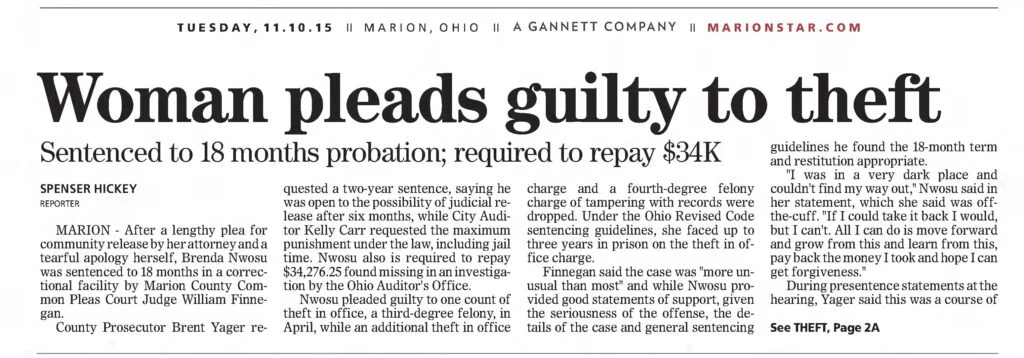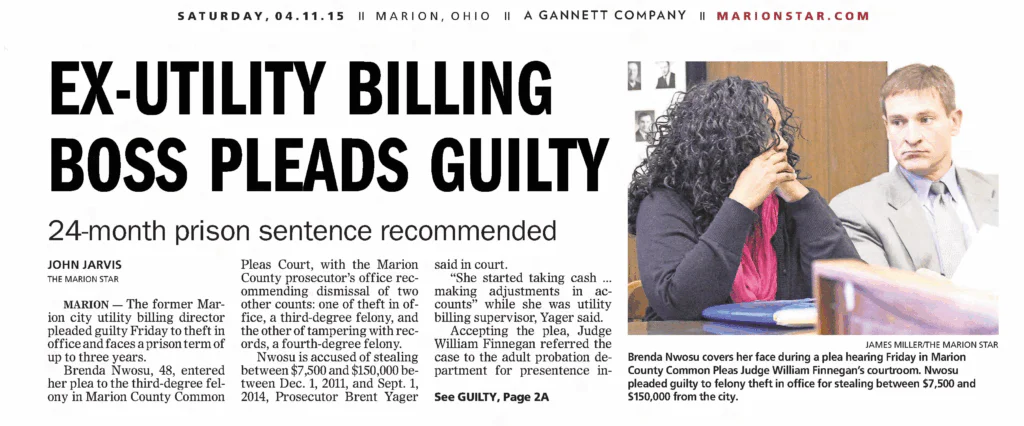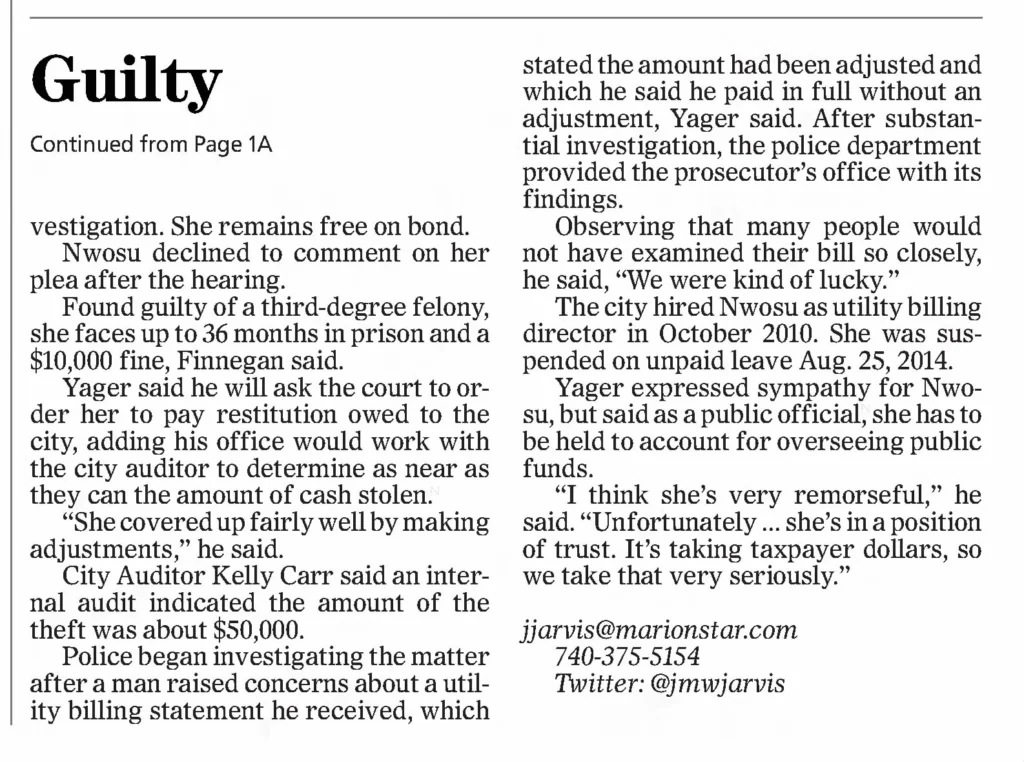For most of its 200-year history, Marion was controlled by a fairly equal distribution of both Republican and Democratic mayors, council members, auditors, treasurers, and law directors.
One party would take over for a while, and then the other would supplant it at the ballot box. Most elected officials would serve for one or two terms of two or four years each, depending on the position, and then head off into the sunset. They certainly didn’t make a career out of politics or bureaucracy.
But that balance of power shifted big time in November 2007, when voters in the city of Marion gave all but complete control to members of the Democratic Party.
The following January, the city of Marion was controlled by a Democratic mayor (J. Scott Schertzer), a Democratic auditor (Kelly Carr), a Democratic treasurer (Thomas A Pannett), and a Democratic law director (Mark D Russell). The Democratic Party also held a supermajority in Marion City Council, with seven of the nine seats held by Democrats (Amy Pinnick- At Large, Mary Crowe-At Large, Ralph Cumston-1W, Ayers Ratliff-2W, Mike Thomas-3W, Debbie Blevins-4W, and John Smith-5W). Republicans, meanwhile, were essentially powerless, holding only two seats on Marion City Council (Jason Schaber-At Large and Dr. James Gilsdorf-6W).

Nationally, the Great Recession, which was largely characterized by the fallout from a crash in the housing market, officially commenced in December 2007 and didn’t officially end until June 2009. The ripple effects, however, were felt for a few years longer.
With a substantial decline in property values, one of the city’s top two sources of revenue, property taxes, declined substantially and placed significant pressure on the city’s finances.
The situation with income tax receipts—the city’s other top source of revenue—was also tenuous, as the Great Recession resulted in an increase in unemployment and a decrease in income tax revenues received into the city’s coffers.

Although city expenditures exceeded city revenues in 2007, the imbalance spiked significantly from 2008 to 2011, with 2009 and 2010 being the very worst years. The spending imbalance was in the millions.

What could the city’s new Democratic leadership do to combat this spending imbalance and impending financial catastrophe?
Well, in the fall of 2008, the Democratic-controlled Marion City Council, after recommendation by Council’s Finance Committee, which was chaired by Ralph Cumston (D-1W), who found himself embroiled in a nearly $60,000 delinquent tax scandal the following year, approved the purchase of a new accounting software system, called New World, which came with an initial price tag of $935,000.
Heralded as a way to “improve efficiency of city services to the public, vendors, and city employees,” the New World software also enabled Marion’s new controllers to better manage (or manipulate) the city’s accounting. Installation of the New World software was completed in July 2009.

Coincidentally, a little more than a year later, in September 2010, Mayor J. Scott Schertzer and his Service Director, Jay Shoup, inexplicably and without cause, terminated the employment of the city’s long-time supervisor of Utility Billing, Brian Carr (no apparent relation to the then-auditor Kelly Carr), who was appointed to the position in 1995 during the Republican administration of Mayor Jack Kellogg.

“Brian’s an upstanding, decent guy. He’s trustworthy, kind of has all the attributes you want…he handled $4.5 to $5 million dollars a year, and every penny was accounted for every year,” Shoup said. But in the end, “He’s a political appointment like every other department head.”
Mayor J. Scott Schertzer, when asked about Mr. Carr’s termination, said “My feeling as the chief executive of the city of Marion is that he wasn’t fully embracing the new software that was put in place.”
Acknowledging the issues with the New World software, Mr. Carr said that “many issues occurred with the new software that I needed help getting fixed, and I got little help in getting them fixed.” Frequent issues with the New World system, according to Mr. Carr, included bank drafting errors and account billing delays.
Both the timing and reasoning behind the Utility Billing supervisor’s termination is highly suspect.
If he was doing a good job, why fire him?
Was it purely political, in that the new Democratic mayor simply wanted to purge some Republicans? After all, as the president of the United States at the time, Barack Hussein Obama, said “Elections have consequences.”

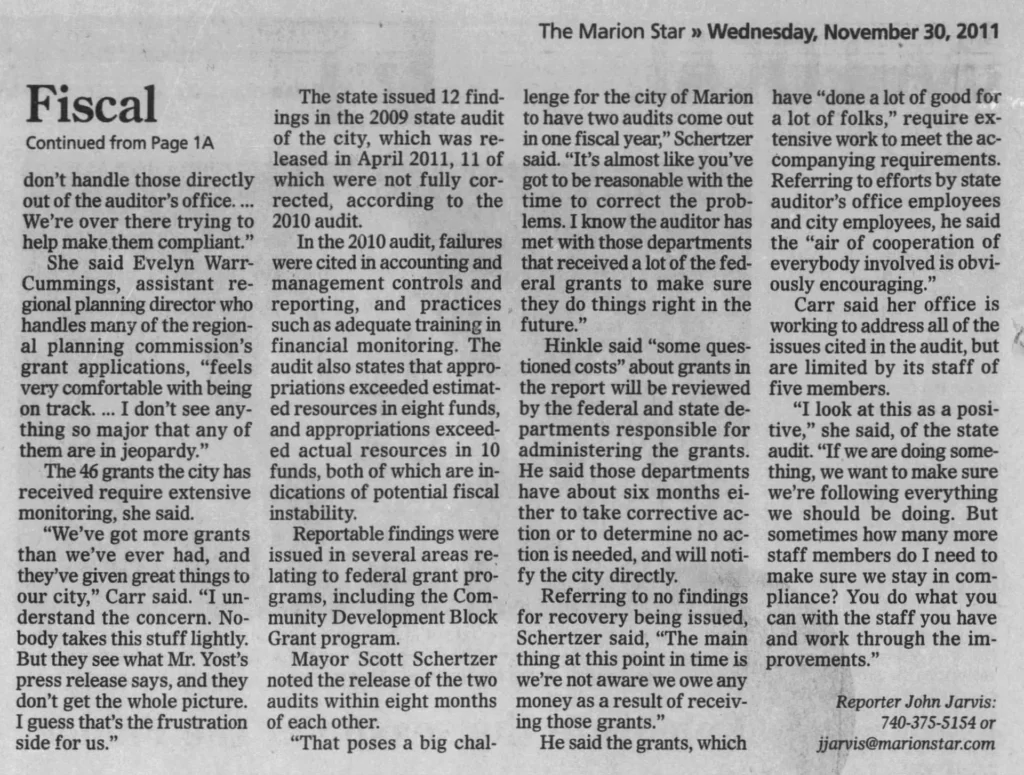
Or was there more to it?
Perhaps they needed him out so that they could work their magic with the system inside one of the city’s most active and lucrative departments? If so, they would certainly need someone in that position who would play ball.
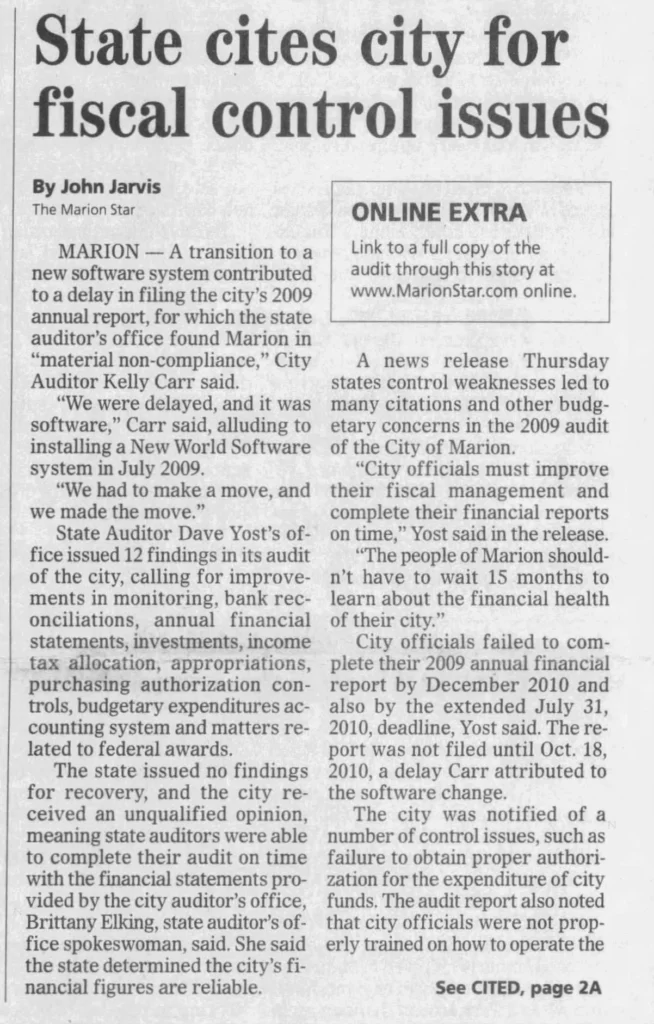
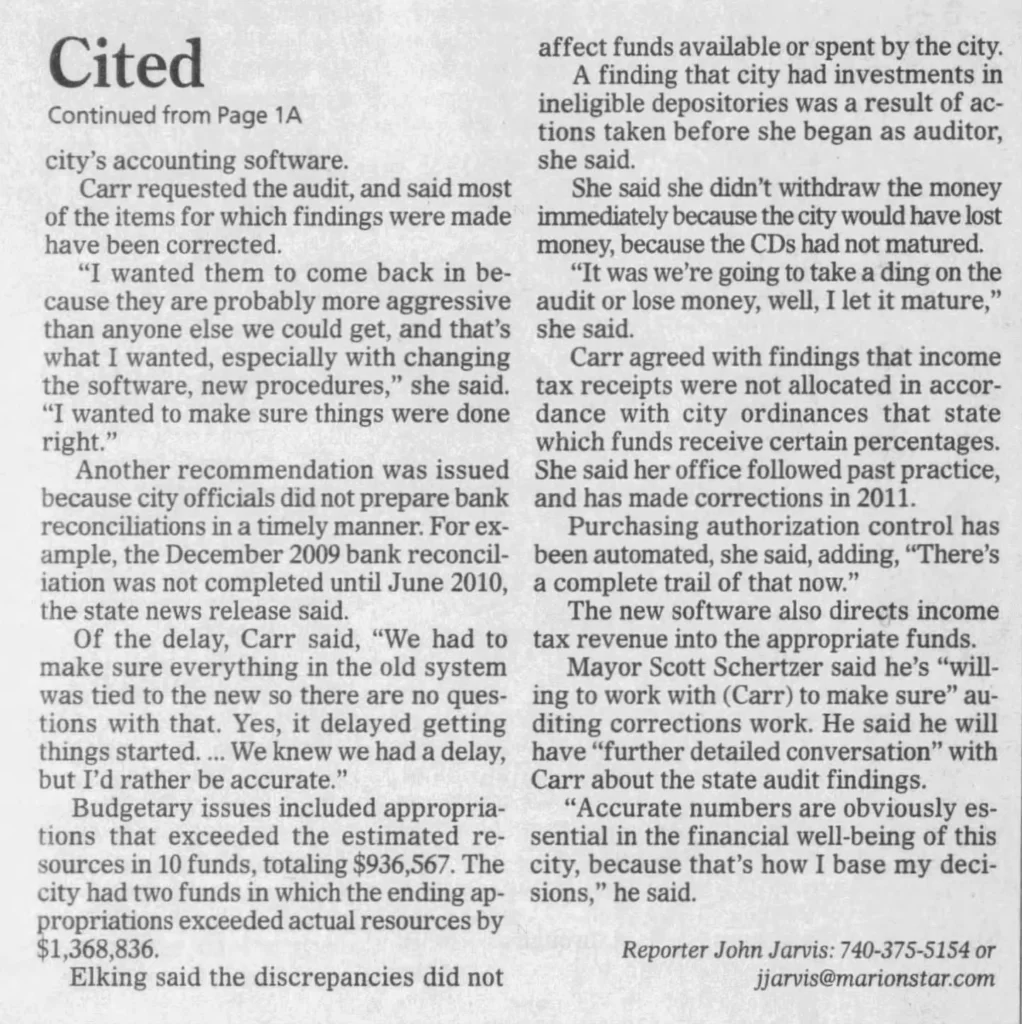
Within two weeks of the termination of Mr. Carr, the Schertzer administration appointed Brenda Nwosu, who was previously employed as a bank teller at Fifth Third bank, to the position of supervisor of Utility Billing. Nwosu would serve in that position until she was fired for stealing over $34,000 from the city and subsequently pleaded guilty to the theft charges in 2015.
Unfortunately, the problems with the New World software and the city’s accounting weren’t resolved after the political decision was made to replace the Utility Billing supervisor.
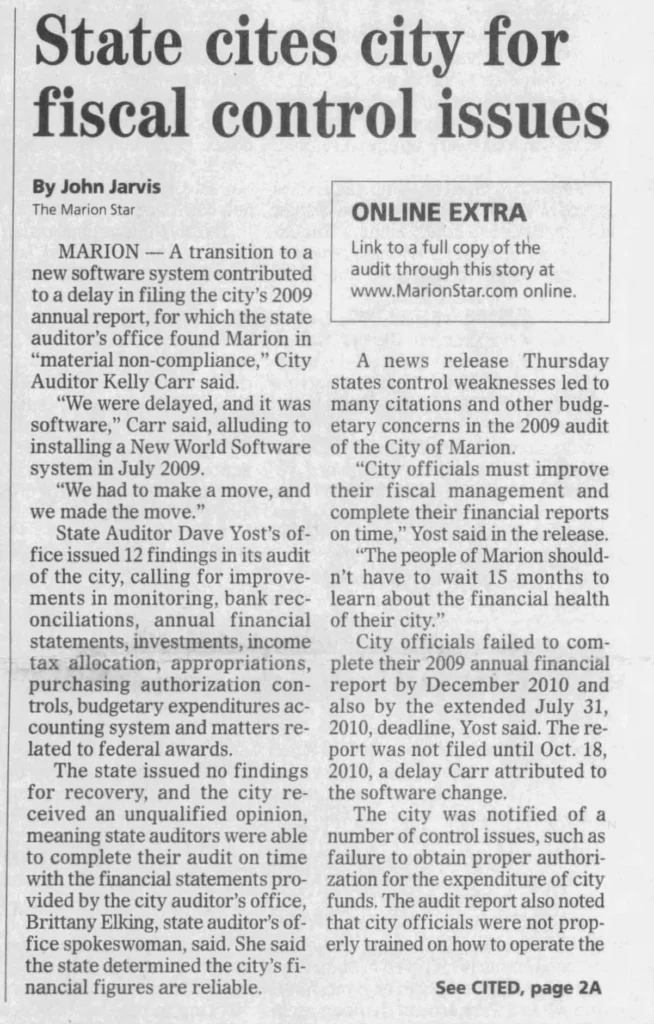
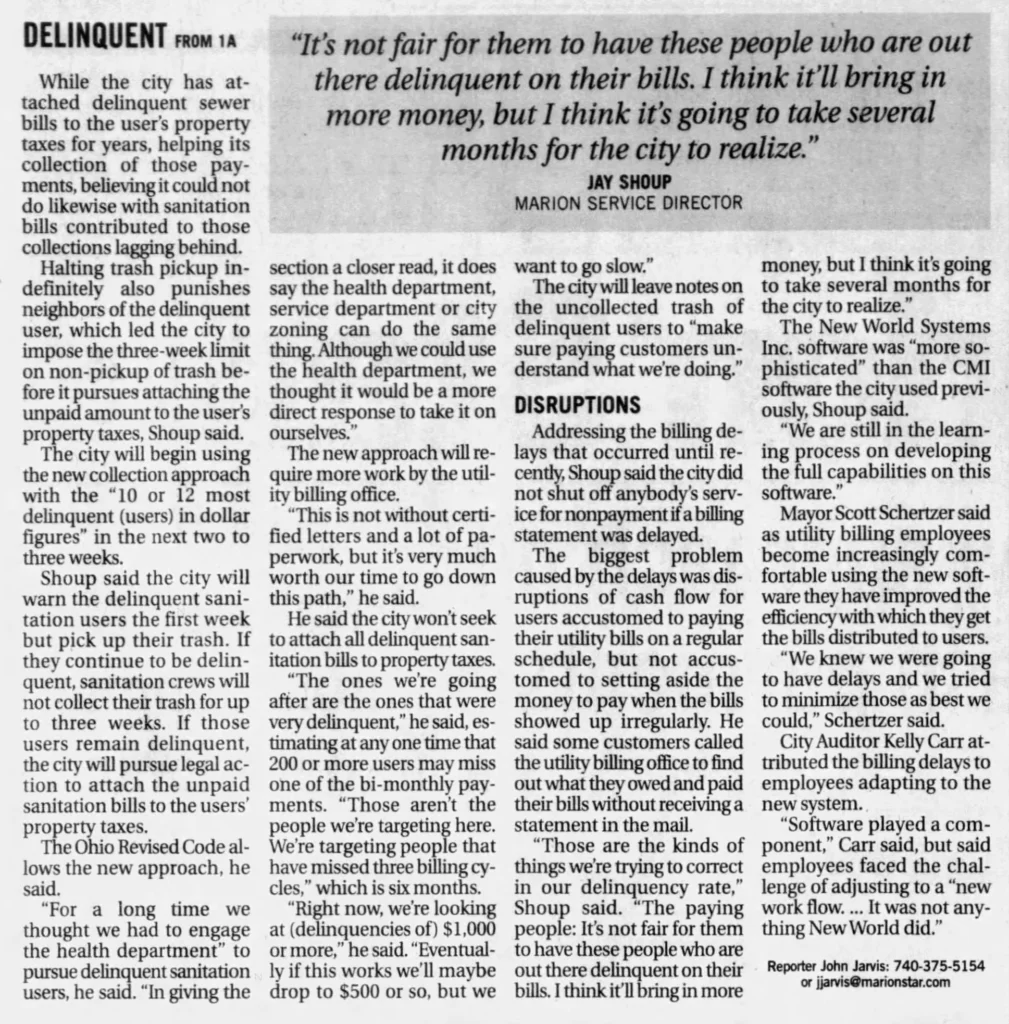
In April 2011, the Auditor of the State of Ohio’s office issued twelve findings in its 2009 audit of the city, which included needed improvements in monitoring, bank reconciliations, annual financial statements, investments, income tax allocation, appropriations, purchasing authorization controls, budgetary expenditures, overall accounting system, and matters related to federal awards. The State Auditor noted that “control weaknesses led to many citations and other budgetary concerns in the 2009 audit of the city of Marion. City officials must improve their fiscal management and complete their financial reports on time. The people of Marion shouldn’t have to wait 15 months to learn about the financial health of their city.”
The State Auditor noted the following major issues within the Marion City Auditor Kelly Carr’s office:
• Failure to obtain proper authorization for the expenditure of city funds;
• City employees not properly trained on how to operate the city’s accounting software;
• City officials did not perform bank reconciliations in a timely manner;
• Appropriations that exceeded the estimated resources in 10 funds by a total of $936,567 and in 2 funds by $1,368,836;
• The city had investments in ineligible depositories; and
• Improper purchasing authorization control.
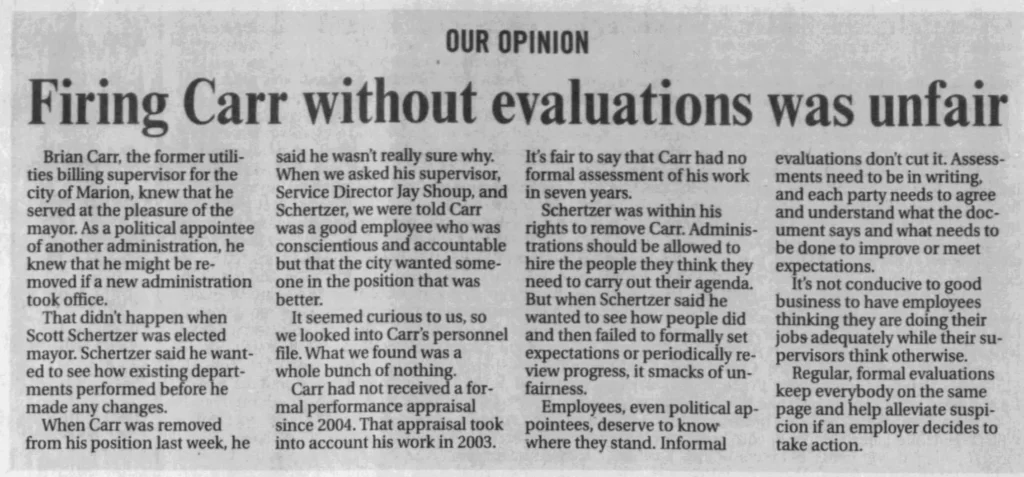
Mayor Schertzer and Auditor Carr promised to carry out the state’s corrective action measures, but the problems with the city’s finances and accounting lingered.
In November of 2011, the State Auditor once again admonished the city of Marion for a “lack of fiscal management and reporting,” citing 22 material weaknesses, material non-compliance and significant deficiencies that affected the financial state of the city.
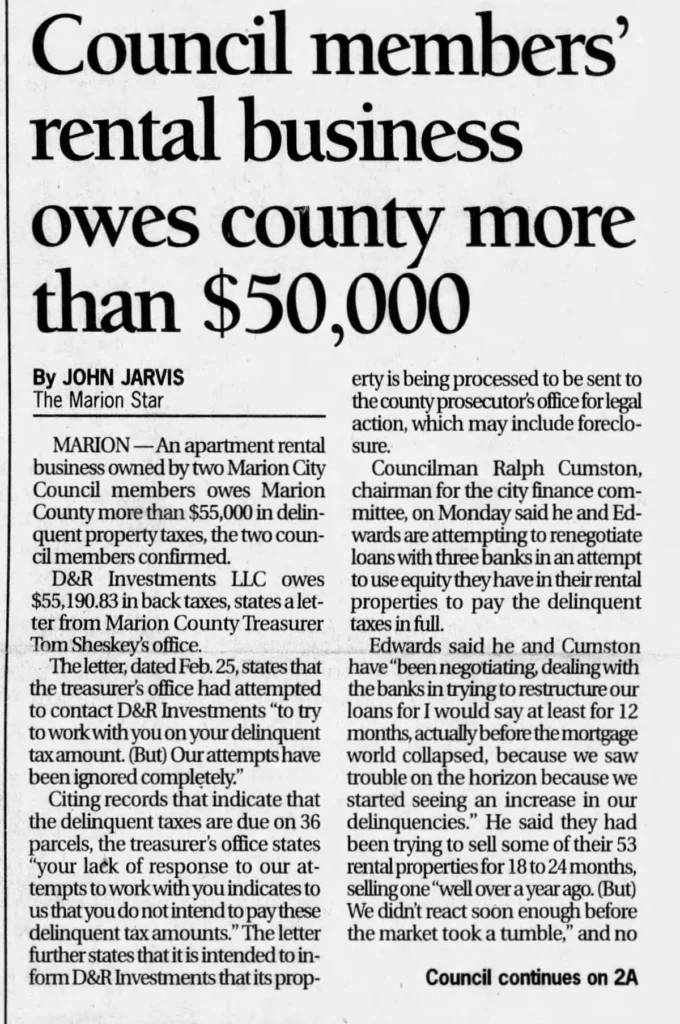
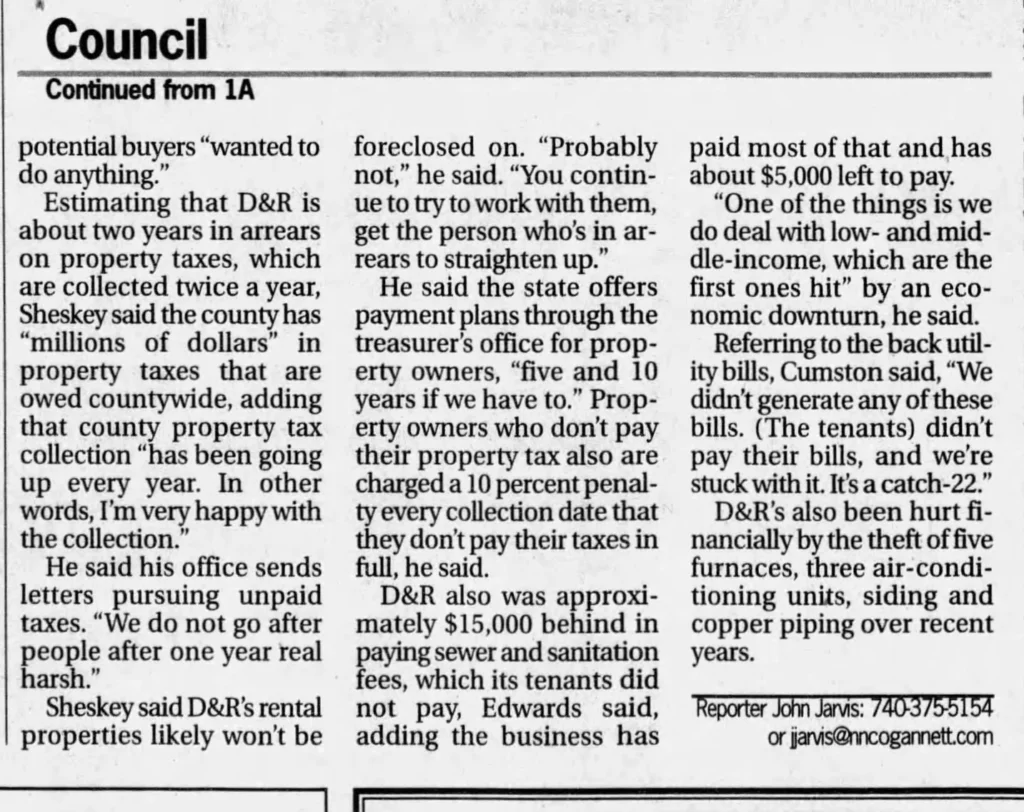

Ohio’s Auditor Dave Yost, in an interview, stated that “twenty-two findings or reported issues in the report of the city of Marion are a lot of issues. The city needs to take some action.”
The state further noted that 11 of the last audit’s 12 findings had not been addressed by the city. Additional reportable findings were issued in several areas relating to federal grant programs, including the Community Development Block Grant program.
To keep this from becoming a book, I’m going to stop here for now. But rest assured, we’ll pick up where we left off.

There are several things that must be acknowledged as fact before we go: 1) elected officials aligned with the Democratic Party had near complete control of the city of Marion beginning in 2008; 2) these Democratic elected officials spent an exorbitant amount of money during the Great Recession to purchase a questionable accounting software program called New World in the fall of 2008 that was installed and operational by July 2009; 3) the city’s expenditures were far exceeding its receipts for a period of at least four years; and 4) the city’s fiscal situation and accounting was highly criticized and questioned by the state of Ohio during this time.
Provided we stipulate as to the aforementioned four items, we may stand a chance at understanding where the city of Marion is at today: facing a fiscal distress analysis by the state of Ohio.
